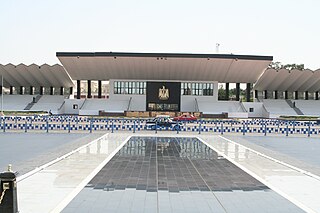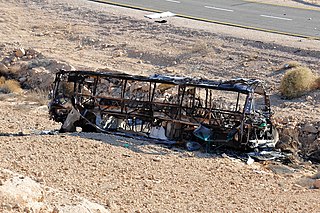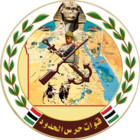
The Egyptian Armed Forces are the military forces of the Arab Republic of Egypt. They consist of the Egyptian Army, Egyptian Navy, Egyptian Air Force and Egyptian Air Defense Forces.

The Gaza–Israel barrier is a border barrier located on the Israeli side of the Gaza–Israel border. Before the 2023-24 Israel-Hamas war, the Erez Crossing, in the north of the Gaza Strip, used to be the only crossing point for people and goods coming from Israel into the Gaza Strip, with a second crossing point, the Kerem Shalom border crossing, used exclusively for goods coming from Egypt, as Israel didn't allow goods to go directly from Egypt into Gaza through the Egypt–Gaza border, except for the Salah Al Din Gate, opened in 2018.

The Gaza Strip smuggling tunnels are smuggling tunnels that had been dug under the Philadelphi Route along the Egypt–Gaza border. They were dug to subvert the blockade of the Gaza Strip to smuggle in fuel, food, weapons and other goods into the Gaza Strip. After the Egypt–Israel peace treaty of 1979, the town of Rafah, in the southern Gaza Strip, was split by this buffer zone. One part is located in the southern part of Gaza, and the smaller part of the town is in Egypt. After Israel withdrew from Gaza in 2005, the Philadelphi Corridor was placed under the control of the Palestine Authority until 2007, when Hamas seized power in 2007, and Egypt and Israel closed borders with the Gaza Strip.

The Philadelphi Corridor, also called Philadelphi Route, is the Israeli code name for a narrow strip of land, 14 km in length, situated along the entirety of the border between Gaza Strip and Egypt.

The Southern Command, often abbreviated to Padam (פד"מ), is a regional command of the Israel Defense Forces (IDF). It is responsible for the Negev, the Arava, and Eilat. It is currently headed by Yaron Finkelman.
Haras El Hodood Sporting Club, is an Egyptian professional sports club based in El Max, Alexandria. It is best known for its professional football team, that competes in the Egyptian Premier League.

Terrorism in Egypt in the 20th and 21st centuries has targeted the Egyptian government officials, Egyptian police and Egyptian army members, tourists, Sufi Mosques and the Christian minority. Many attacks have been linked to Islamic extremism, and terrorism increased in the 1990s when the Islamist movement al-Gama'a al-Islamiyya targeted high-level political leaders and killed hundreds – including civilians – in its pursuit of implementing traditional Sharia law in Egypt.

The Ministry of Interior of Egypt is a part of the Cabinet of Egypt. It is responsible for law enforcement in Egypt.

The Egypt–Gaza barrier is a steel border barrier constructed by Egypt along its 14 km border with the Gaza Strip. The Rafah border crossing is the only border crossing between the Gaza Strip and Egypt.

Egypt–Palestine relations are the bilateral relations between the Arab Republic of Egypt and the State of Palestine. Egyptian President Gamal Abdel Nasser was a strong supporter of the Palestinian cause and he favored self-determination for the Palestinians. Although the Egyptian government has maintained a good relationship with Israel since the Camp David Accords, most Egyptians strongly resent Israel, and disapprove of the close relationship between the Israeli and Egyptian governments.

On August 18, 2011, a series of cross-border attacks with parallel attacks and mutual cover was carried out in southern Israel on Highway 12 near the Egyptian border by a squad of presumably twelve militants in four groups. The attacks occurred after Israel's interior security service Shin Bet had warned of an attack by militants in the region and Israeli troops had been stationed in the area. The militants first opened fire at an Egged No. 392 bus as it was traveling on Highway 12 in the Negev near Eilat. Several minutes later, a bomb was detonated next to an Israeli army patrol along Israel's border with Egypt. In a third attack, an anti-tank missile hit a private vehicle, killing four civilians. Eight Israelis – six civilians, one Yamam special unit police sniper and one Golani Brigade soldier—were killed in the multiple-stage attack. The Israel Defense Forces reported eight attackers killed, and Egyptian security forces reported killing another two.
The August 2012 Sinai attack occurred on 5 August 2012, when armed men ambushed an Egyptian military base in the Sinai Peninsula, killing 16 soldiers and stealing two armored cars, which they used to infiltrate into Israel. The attackers broke through the Kerem Shalom border crossing to Israel, where one of the vehicles exploded. They then engaged in a firefight with soldiers of the Israel Defense Forces (IDF), during which six of the attackers were killed. No Israelis were injured.

The Sinai insurgency was an insurgency in the Sinai Peninsula of Egypt, launched by Islamist militants against Egyptian security forces, which have also included attacks on civilians. The insurgency began during the Egyptian Crisis, during which the longtime Egyptian president Hosni Mubarak was overthrown in the 2011 Egyptian revolution.

Operation Sinai is an ongoing Egyptian military campaign, launched in early August 2012, against Islamic militants within the Sinai Peninsula to crush the Sinai Insurgency. The operation came as a direct response to the 2012 Egyptian-Israeli border attack on 5 August 2012. The operation was initially reported as part of "Operation Nisr", but on 3 September 2012, the Egyptian army issued a statement requesting media sources to use the official name "Operation Sinai."
September 2012 southern Israel cross-border attack refers to an incident on 21 September 2012, when three Egyptian militants, wearing civilian clothes and armed with explosive belts, AK-47 rifles and RPG launchers, approached the Egypt-Israel border in an area where the Egypt–Israel barrier was incomplete, and opened fire on a group of IDF soldiers supervising the civilian workers who were constructing the border fence.

Ansar Bait al-Maqdis, or Ansar Al-Quds, was a jihadist, extremist terrorist group based in Sinai from 2011-14.
On 24 October 2014, ISIL militants launched two attacks on Egyptian army positions in the Sinai Peninsula, killing at least 33 security personnel. This was one of the deadliest assaults on the Egyptian military in decades.

The Islamic State – Sinai Province was a branch of the terrorist Islamist group Islamic State that was active in the Sinai Peninsula of Egypt.

In July 2013, at the same time as mass protests began against the 3 July coup d'état which deposed Mohamed Morsi, and in parallel with the escalation of the already ongoing jihadist insurgency in the Sinai Peninsula, pro-Muslim Brotherhood militants started violent attacks against policemen and soldiers in central and western Egypt. In the following months, new Islamist armed groups were created to reinstate Islamist rule in Egypt, like Soldiers of Egypt and the Popular Resistance Movement. Since 2013, violence in mainland Egypt has escalated and developed into a low-level Islamist insurgency against the Egyptian government.
Comprehensive Operation − Sinai 2018 is the code name of a large counter-terrorism campaign conducted by the Egyptian Armed Forces and the Interior Ministry. The operation was initiated on February 9, 2018, and focuses on northern and central Sinai and parts of the Nile Delta. It mainly targets Islamist insurgents, as well as "other criminal activity that affects national security and stability", according to the Armed Forces press statement that announced the start of the campaign.















